Saying No to the iPod 17 years, 6 months ago by Martey Dodoo

First in a series.
On Tuesday of last week, Defective By Design held their first Day Against DRM. Across the globe, small groups of concerned citizens took aim at restrictive content systems aimed at protecting the rights of publishers at the expense of consumers. One of their targets were Apple, whose FairPlay DRM helps "protect" files downloaded from the iTunes Music Store. While people often claim that one can use an iPod without purchasing music from the iTunes Music Store (by buying CDs, for example), it is clear that Apple's marketing strategy includes using the iPod as a loss leader in order to entice people to buy both songs from the iTunes Music Store and additional Apple hardware.
While protesting at Apple stores and replacing the firmware on iPods are noble actions in themselves, it would be even better if people did not buy iPods in the first place. To some extent, whether a portable music player supports DRM or not is a non-issue for me. Far more important is whether the player can play music in the formats that my collection are in (so I do not have to do lots of transcoding).
Now, I get the impression that most people's music collections are in either one or two formats - either just MP3 or MP3 plus one of the "second-generation" lossy formats like WMA and AAC. If this was the case with me, selecting a player would be simple as pie. Virtually every player on the market today supports MP3. Most of them support WMA as well. And if my collection was just MP3+AAC, I would be fine with an iPod.
Alas, this is not the case. While I have many MP3s, there was a period of time (while I was using iTunes and an iPod) where I ripped my CDs into AAC (this required re-ripping all of the music I had previously ripped into OGG). Currently, I am ripping everything into FLAC.
The bad news: As far as I know, there is no player on the market that supports MP3, AAC, and FLAC.
The good news: FLAC is lossless, which means it is a complete copy of my music. This means I could easily convert it to AAC. Alternatively, I could convert the AAC files to FLAC. Both options would not result in a loss of sound quality. Banshee supports such transcoding to portable devices.
The simplest solution would be to continue using my multi-format collection on my laptop, and just use MP3 and AAC on my portable music player[1]. As I mentioned earlier, this combination of formats would point me towards an iPod - probably the Nano, since I actually like having a screen.
But I use Linux, so I would need to rely on third-party programs like Banshee or Rhythmbox to manage my iPod. This would be fine, but Apple makes it difficult for such programs to work by constantly changing the internal formats and files that make the iPod work. This is fine for people using Windows or OS X, because the vast majority of them are using iTunes, which is updated each time that Apple decides to change something. For Linux users, it is necessary for the developers of their programs to realize that something is wrong, and then somehow figure it out in order to get updated iPods working. From my point of view, it seems stupid to give Apple money so that they can produce programs and firmware updates that will stop my iPod from working.
Of course, I could just put a third-party firmware onto my iPod. While this would eliminate Linux compatibility issues, it just seems wrong. Why should I pay $250 for an electronic device when I know that I have to void my warranty in order to get it to work?
Surely, one would think that there would be a better solution. In the upcoming weeks, look for posts on the issues with buying from other companies like iRiver, Cowon, and Neuros.
--
[1] I am interested in purchasing a flash-based music player, so saving space is important. Hence, I should transcode (or better yet, get Banshee to transcode) my FLAC files into something else.